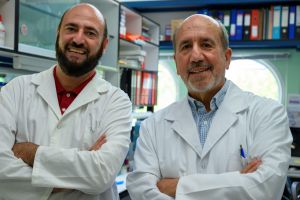“Para el CSIC es un honor seguir colaborando con la Organización Mundial de la Salud y con la iniciativa de la ONU Medicine Patent Pool, para hacer llegar las tecnologías sanitarias de la covid-19 a todos los países que las necesiten, y especialmente a los países en vías de desarrollo”, señala la presidenta del CSIC, Eloísa del Pino. “La iniciativa COVID-19 Technology Access Pool de la OMS y la Medicines Patent Pool es un marco idóneo para facilitar la transferencia del conocimiento a quienes tienen menos recursos”, añade.
Una vacuna covid-19 con 100% de eficacia probada en modelos animales
La vacuna está basada en el vector virus vaccinia modificado de Ankara (MVA) que expresa la proteína de la espícula (S) del SARS-CoV-2 estabilizada en prefusión [referida como MVA-CoV2-S(3P)]. El prototipo vacunal ha sido desarrollado por el equipo de los investigadores Mariano Esteban y Juan García Arriaza, del Centro Nacional de Biotecnología (CNB) del CSIC, pertenecientes también a la Plataforma Temática Interdisciplinar Salud Global del CSIC, que ha contado con financiación de los Fondos de Recuperación europeos. El desarrollo de su producción industrial bajo estándares de calidad se ha realizado a través de la colaboración del CSIC con la empresa española Biofabri.
Estudios realizados en diversos modelos animales demuestran de forma detallada que la vacuna MVA-CoV2-S (3P) activa el sistema inmunitario y protege frente a la infección por el coronavirus SARS-CoV-2. Por un lado, la vacuna activa una respuesta inmunitaria de células T CD4 y T CD8 específicas frente a SARS-CoV-2, que es robusta, amplia, de alta calidad y duradera. Por otro lado, la vacuna induce altos niveles de anticuerpos de unión IgG frente a la proteína S y el dominio de unión al receptor (RBD) del SARS-CoV-2, así como de anticuerpos neutralizantes frente a la variante parental de Wuhan o frente a distintas variantes del virus, que también son duraderas.
De forma importante, la vacuna protege frente a la infección por el SARS-CoV-2, evitando la replicación del virus tanto en el pulmón como en el cerebro, así como la patología asociada (daño pulmonar y cerebral, y ausencia de tormenta de citoquinas, entre otros parámetros). Además, en el modelo de ratón, la vacuna previene de la mortalidad causada por el SARS-CoV-2.
Este acuerdo de licencia con la organización MPP, socio implementador de la iniciativa C-TAP de la OMS, abre la posibilidad de encontrar aliados en terceros países para avanzar hacia los ensayos clínicos con esta vacuna y que en el futuro sea una alternativa a las opciones de vacuna covid-19 autorizadas en todo el mundo, especialmente, en países de menores recursos.






